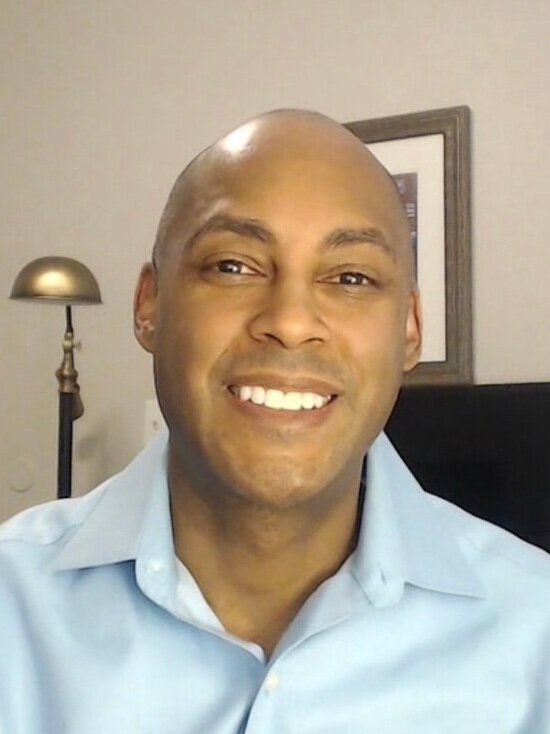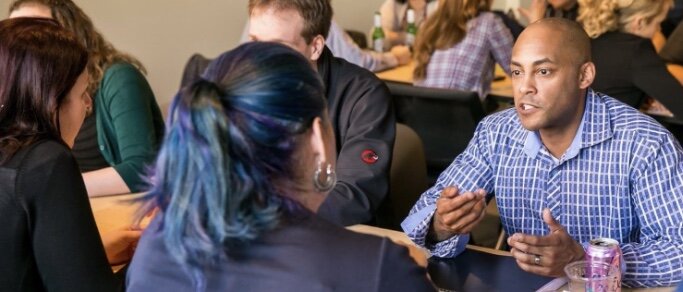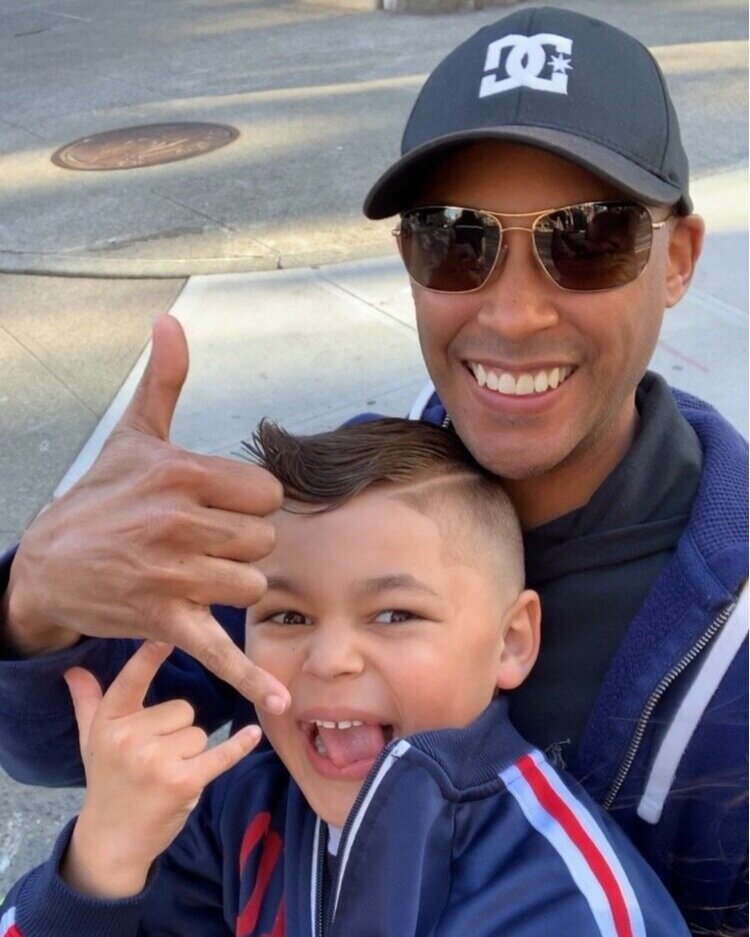From social media and digital marketing strategy to conversational design and app development, Ferdinand Mehlinger of Bluoo Digital is a versatile leadership consultant with a glint in his eye, a ready smile, and some serious glow factor. The man simply vibrates and lights up when talking shop.
Ferdinand is a techie, but also a people lover and an avid gardener. He has a green thumb when it comes to business, too. Growth on several cylinders is what he’s all about.
“My track record includes a strong talent for building a loyal base of customers and delivering top-level performance, resulting in sustainable growth for myself and my clients,” says Ferdinand.
“One of the highlights of my early career accomplishments was working at Backrub/Google out of satellite offices and the Menlo Park location. We introduced a quarter of the first corporate websites hosted through Google in Southern California. I collaborated on programming and coding some of the original algorithms on Google servers!”
Along the way, Ferdinand has experienced both highs and lows in business, but his philosophy is steadfast and sanguine. Turns out, he used to try to make other people money, always completely focused on them and getting the bills paid, but the money aspect just wasn’t working for him. “Sure, it just sucks when you lose, I know, but my wife has always held me together. She’s the root to my success.”
How does Ferdinand move and shake today? “Your life is what you make it. I look at some of my friends, colleagues, clients. They’re busting it out, working like maniacs, doing it for ‘their boss’. The reality is you don’t have time to make it your whole life. You’ve got to put that out into the universe, that transformation.”
>
“ Your life is what you make it. I look at some of my friends, colleagues, clients. They’re busting it out, working like maniacs, doing it for ‘their boss’. The reality is you don’t have time to make it your whole life. You’ve got to put that out into the universe, that transformation.”
As it turned out, with Ferdinand’s art of conversation, one thing led to another with “pretty cool” and high-profile clients—and sitting on boards of different organizations. Everything snowballed to where he is now—playing in the garden and having fun. Lots of it.
So whether Ferdinand is partnering with venture capitalists in the UK or in the US, he mentors business with three rules to success: “Hire the right people. Fire the right people. And hire the right people to replace those you’ve fired. Oh, and don’t forget to plant seeds.”
What have you been most excited about this week?
Ferdinand: I went to Home Depot like six times today, picking up black mulch, seeds, orange, pink and yellow flowers, which give my garden the “ah” factor. I’ve created a little pathway out of river rock and made steps with orchids along the side. It was crabgrass before. [The garden] is my way of going with the flow and escaping the tech world’s digital footprints.
Tell us more about what you mean when you say “conversational design”.
Ferdinand: I believe that conversational design is the next big wave. It’s the way things are going to be when, for instance, you order at McDonald’s or have a conversation with a normal human being. Alternatively, Facebook is a very restrictive way to communicate in terms of interfacing what’s said or expressed. Whereas a chatbot is pretty much uninhibited and free as a bird, far more conversational than a lot of current voice automation.
Because we often don’t have traditional human support anymore, conversational design resides within the programming for a bot, a kind of Lego for conversation.
One of my clients is Wells Fargo. They brought me in as a consultant for their support chatbots in the US arena to help customers with their banking needs. Artificial Intelligence (AI) can have different sequences, flows, and keywords that, when triggered, provide a bot with the opportunity to answer, pretty much like a human being.
If you don’t know how to design that, the bounce rate kicks in when a person leaves your website. Wells Fargo didn’t want that. Instead, they wanted to keep a customer’s conversation with the bot going as a question-and-answer experience, collecting data which is then stored.
I see technology as artwork, so I know how to piece sequences together successfully. Technology gets me excited. But if you don’t design it the right way for a typical conversational flow, it’s going to be a mess.
How has Vibe served you in this community?
Ferdinand: It’s not necessarily about what it does for me as an individual, but what Vibe does for everyone. It’s great what Vibe has done for this community, creating all of these networking and leadership possibilities. Alanna and Marcel (Vibe’s founders) are amazing visionaries in what they offer and provide to Kitsap. Why sit at home and push yourself to get going? I love the “can do” vibe at Vibe.
>
“It’s not necessarily about what it [Vibe] does for me as an individual, but what Vibe does for everyone… Why sit at home and push yourself to get going? I love the “can do” Vibe at vibe.”
What do you think we can look forward to in artificial intelligence?
Ferdinand: I really do think that the introduction to the whole world of robots serving you, having conversations with, say, your car, all of this is preparing us for conversational design. We do it already every day with androids like Google, Alexa, and Siri. It’s a huge wave of progress. Now we can render such advancements to where you feel that you’re having an actual chat with a bot. You can tag “conversational attributes.”
For example, you’re chatting away and say something like “That’s hot” or “That’s awesome,” like a teenager would. Your AI platform identifies that you’re within a particular age group (if you haven’t asked the question) and can then better personalize exchanges with you. It gets to know how you talk—and incorporates those language details into the bot’s IQ, so to speak. It’s really crazy, but really cool, too.
Your dream dinner guest would be…
Ferdinand: Oh, gosh. Do I only get one? I would say, Sun Tzu. He wrote The Art of War. Military commanders and Napoleon and so many leaders have read his book and won wars by doing so. Business is war cause you’re always making sure you fight to survive. I’d love to sit down and pick his brain.
Frederick Douglass would also be a welcome guest, the American social reformer, orator, and writer. He escaped slavery in Maryland and became a national force in the abolitionist movement. I would love to really know how he got through all that. I can’t imagine how Douglass created such a legacy from nothing.
The best rock band of all time is…
Ferdinand: Probably The Beatles because of their message. I think that they were trying to get to this day where we should be of one. All together. No separation and segregation. It should all be one, great big love. Listening to them takes you to a different era and feeling. There’s a lot of good going on, but there’s still a lot of anger in the world. People are angry.
Where did you grow up?
Ferdinand: Mission Viejo, California. And Pasadena. I had to take family moments and transition from them and learn from them. Having a real dad that abandoned you… you learn at that age, okay, what do you do with that? I could have turned into some crazy beast of a kid and held on to a lot of hostility and anger. Or you can choose to transform yourself through it. My huge driving factor, huge, huge, is to shut people up with my success. Everyone who doubted me or simply didn’t like me.
Have you attended any of the Vibe workshops?
Ferdinand: I spent some time volunteering as a mentor for the 6 Month Startup program that Startup Kitsap hosts at Vibe. I like to help people with their businesses, to help them gain a strong position when they take their product or service to market. And they may want to keep that enterprise or sell it.
A lot of my knowledge is the result of experience and business mentors; no Wharton School of Business for me. I begged captains of industry to take me on. With the release of my second app, I spent close to one year just in market research, which was very intense but validating. Then again, when you get to a certain point in business, you’re validated just by the meetings you have with people.
What else are you up to these days?
Ferdinand: Now I’m talking with captains of industry, and I’m currently partnering on a project that will launch an IT initiative for a village in Africa. We’re not making a profit, but we’re contributing to how people can brand themselves differently to succeed in business—how to learn graphic design, the technology within that process, how to get a website going.
It’s for Kings & Priests Preparatory, a huge Christian organization out there. We’re still focused on launching the test website, which is aimed at 200 community children and 21 teaching and non-teaching members of the class. We’ve been able to subsidize school fees for many and to build up a higher standard of education.
Dinner you can’t resist?
Ferdinand: Smoked ancho chili chicken-based sauce with mozzarella on top of some rice with a little bit of tomato paste, a little bit of zucchini or asparagus or spinach or artichokes, and/or peppers. I’m not a big dessert fan, but it would be a bowl of Fruity Pebbles.
Have you got a mantra?
Ferdinand: Work with what you’ve got and change the way you look at things. Then the things you’re looking at change. They call me the phoenix. I just rise from the ashes. You can’t hold me down.
>
“My huge driving factor—huge, huge driving factor—is to shut people up with my success. Everyone who doubted me or simply didn’t like me. I love to prove them wrong. ”
Honestly, if you want something, you manifest it by just doing that. I’ve been broke as a joke. You can’t take the excuses of losses to hold you down. Turn your words and thoughts into action. Money is a by-product. It’s easy, it’s basic. Earning it is just something we do, not who we are.
You’ve got to tell the universe what you want. Write it down. My biggest accomplishment is in doing, not being afraid. When the walls come crumbling down, you have to push them back up. Even if you lose, you still need to win. I have a lot to contribute. That’s where the universe will guide me.
Meet the author: Vibist Susan O’Meara is a Poulsbo-based freelance writer, editor and journalist with global experience. Back in the day, Susan did event marketing for the electrified Don King, boxing’s bad-boy biz whiz. Then she got roped into writing and producing TV spots for Love Boat: The Next Wave, the ‘90s reboot, and nonfiction programming for Showtime (e.g., Roswell: The Real Story). She’s not sure which was more surreal—going with the flow of those Hollywood highs, so to speak, or navigating Nairobi’s magazine scene. Susan has worked in the US and abroad for the likes of Bloomberg Media, Deloitte, Discovery Communications, and the United Nations. She’s obsessed with wrangling language and messaging that helps brands, businesses, and individuals to grow and shine. Except when it comes to Don King’s hair.





